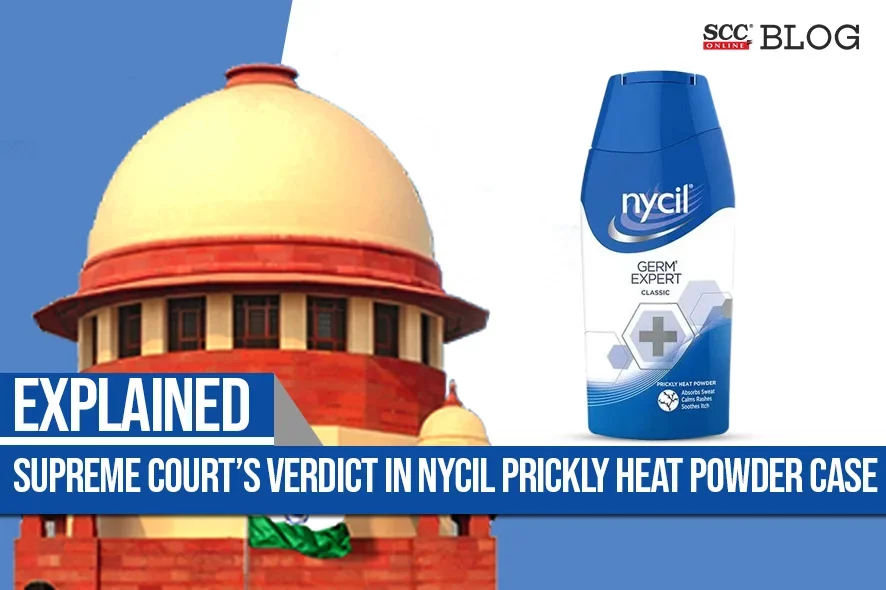Supreme Court: In a set of appeals against the Kerala High Court and Madras High Court judgments, wherein the Courts held that Nycil Prickly Heat Powder is a ‘medicated talcum powder’ and not a ‘medicine’, the division bench of S. Ravindra Bhat* and Dipankar Datta JJ. upheld the impugned judgments, ruling that Nycil Prickly Heat Powder is appropriately classifiable as medicated talcum powder and not as a medicament itself.
Background:
In the first set of appeal, the Kerala High Court rejected the revisions filed by the appellant (‘Heinz’) aggrieved by the Kerala Sales Tax Appellate Tribunal’s orders holding that its product “Nycil Prickly Heat Powder” was classifiable not under Entry 79 of the First Schedule to Kerala General Sales Tax Act, 1963 (hereafter “KGST Act”) as “medicine” but as “Medicated Talcum Powder”.
In the second set of appeal Glaxo Smithkline Pharmaceuticals Ltd (“GSK”) is aggrieved by the judgment of the Madras High Court, wherein the court rejected its contention that the prickly heat powder was “medicinal formulation or preparation ready for use internally or externally for treatment or mitigation or prevention of diseases or disorders in human being or animals” under Entry 20-(A) of Part C of First Schedule to the Tamil Nadu General Sales Tax Act, 1959 (‘TNGST Act’) and held it to be toilet powder under Entry 1(iii) of Part-F of First Schedule of the TNGST Act.
The assessees contended that the product is sold under the trade name Nycil powder. They market the substance known as ‘Chlorphenesin’. Nycil powder contains zinc oxide and boric acid. They constitute 32% of the total contents of Nycil. The rest is starch and talc. Nycil powder is designed to keep the skin clean and offer protection against prickly heat and infection besides giving comfort and freshness. Therefore, it would fall under Entry 79 of the First Schedule to the KGST Act.
Issue: Whether medicated talcum powder is medicine or drug, or a cosmetic in terms of the Kerala General Sales Tax Act, 1963 (‘KGST Act’)?
Analysis
The Court said that talcum powder is made from talc, which is a common silicate material that is distinguished from almost all other minerals by its extreme softness. As per the literature made available to the Court, there are medicinal ingredients in Nycil prickly powder, which is also manufactured under a drug license. Yet, the State Legislature, in Entry 127, thought it fit to include, while dealing with cosmetics, such as shampoos, talcum powder including medicated talcum powder. As per the Court there can be no two opinions that talcum powder ipso facto is classifiable as a cosmetic. Yet, the expression “including” used in Entry 127 has the effect of bringing in or “pulling in” an entirely different product, which ordinarily may not have been in the same class, i.e., medicated powder. To rule out any ambiguity, the legislature specifically referred to a sub class of medicated powders, i.e., medicated talcum powder.
The Court noted that the courts have ruled that in the context of broad descriptions such as cosmetics or medications, if there are medical ingredients, in a product, which is meant as a curative or prophylactic product, it would be classifiable as drugs or medicines. However, the specificity employed by the legislature in this case rules out that possibility. Besides, “includes” has been construed as broadening the sweep of a provision, and at the same time restricting its amplitude to the meanings ascribed in the statute.
On the use of the term “includes” after talcum powder, followed by “medicated talcum powder” the Court opined that the legislative intent was that all kinds of talcum powders, which contained medications (irrespective of the proportion, or at any rate, not containing predominant proportions) should necessarily be treated as cosmetics, falling under Entry 127.
The Court said that a rule for fiscal legislation interpretation is that words used in the statute must be given their plain meaning. Thus, the Court’s function is not to give a strained and unnatural meaning to the provision.
In the present case, the clear legislative intent, of inserting a carefully worded entry, which was a hybrid one, i.e. describing an article that contained medicinal ingredients, as well as those used for cosmetics, and yet placing such a creature in the category of cosmetics, ruled out altogether any interpretive scope of classifying it as a medicinal preparation, or drug or medicine. Therefore, the Court upheld the Kerala High Court’s decision.
Concerning the second appeal, the Court said that the TNGST was consciously amended to include talcum powder, whether or not medicated in the specific entry or class of entries, enumerating cosmetics. Hence, like in the Kerala case, the plain meaning of that taxation head or entry had to be given, as there was no ambiguity. Thus, the Court upheld the Madras High Court’s decision.
Also read: Heinz India Verdict – The Subtleties Segregating Medicaments and Cosmetics.
[Heinz India Ltd. v. State of Kerala, 2023 SCC OnLine SC 561, decided on 04-05-2023]
*Judgment Authored by: Justice S. Ravindra Bhat







I’ve found out about changed arrangement, and it emits an impression of being a particular benefit. I’d a ton of need to investigate a blog segment about how drug affiliations are taking on this method.